1人教版八年级英语上册导学案(全册)
- 格式:doc
- 大小:1.36 MB
- 文档页数:151
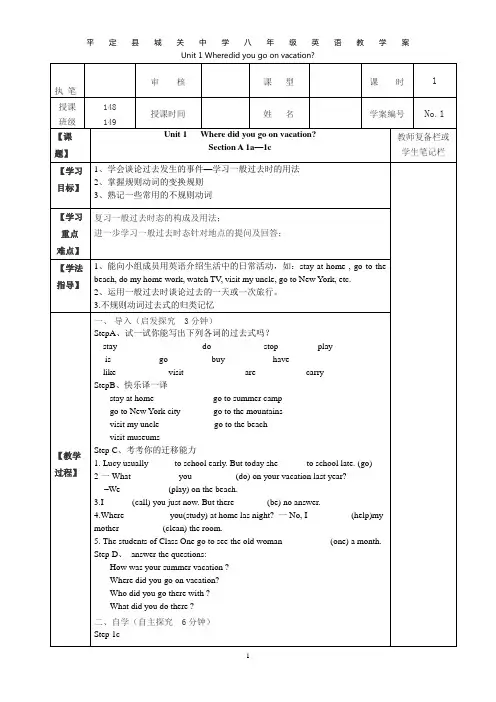
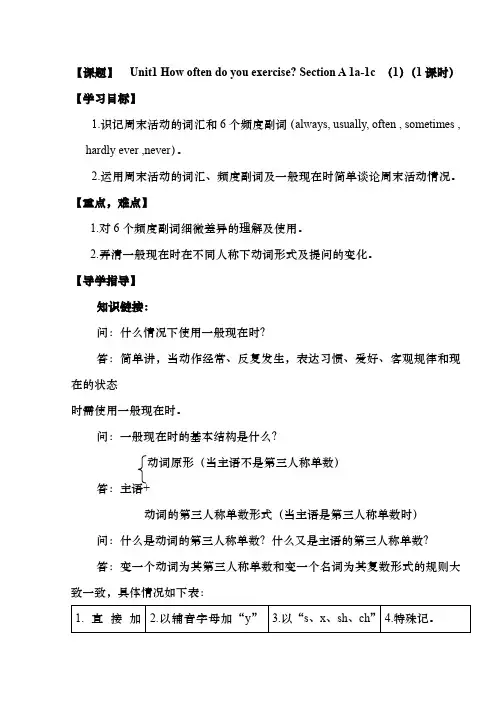
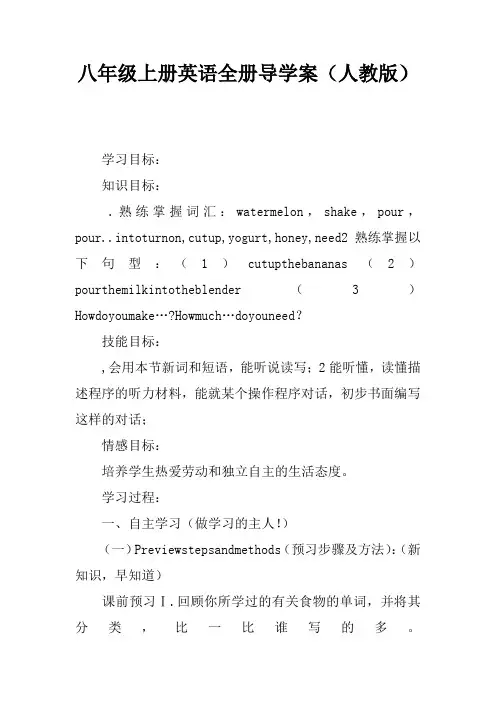
八年级上册英语全册导学案(人教版)学习目标:知识目标:.熟练掌握词汇:watermelon,shake,pour,pour..intoturnon,cutup,yogurt,honey,need2熟练掌握以下句型:(1)cutupthebananas(2)pourthemilkintotheblender(3)Howdoyoumake…?Howmuch…doyouneed?技能目标:,会用本节新词和短语,能听说读写;2能听懂,读懂描述程序的听力材料,能就某个操作程序对话,初步书面编写这样的对话;情感目标:培养学生热爱劳动和独立自主的生活态度。
学习过程:一、自主学习(做学习的主人!)(一)Previewstepsandmethods(预习步骤及方法):(新知识,早知道)课前预习Ⅰ.回顾你所学过的有关食物的单词,并将其分类,比一比谁写的多。
Drink:_______________________________Fruit:_______________________________Vegetables:__________________________Food:________________________________Ⅱ.和同伴合作,把这些食物按可数和不可数名词分类。
可数名词:___________________________不可数名词:__________ 课堂学习Beforelistening1.结合课前准备Ⅰ的内容,完成1a。
2.运用生活常识,依据图画提示,通过和伙伴的探讨,了解制作水果奶昔的步骤。
(二)听力练习1b,2a,2b,并完成相应任务.二、合作交流:co-operation.小组练习对话1c,2c。
三、展示点拨:DisplayRoleplaytheconversationsin1cand2c.Showtotheclasses.四、巩固提升:Exerciseinclass(别低估了自己的潜力!)根据首字母提示补全单词,使句子完整通顺。
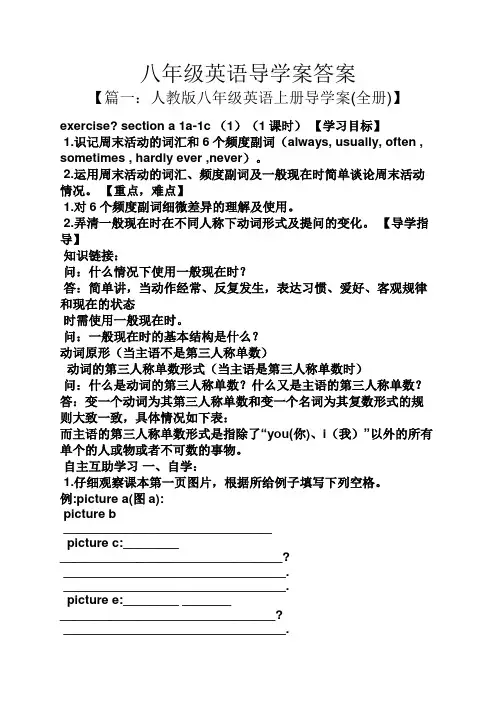
八年级英语导学案答案【篇一:人教版八年级英语上册导学案(全册)】exercise? section a 1a-1c (1)(1课时)【学习目标】1.识记周末活动的词汇和6个频度副词(always, usually, often , sometimes , hardly ever ,never)。
2.运用周末活动的词汇、频度副词及一般现在时简单谈论周末活动情况。
【重点,难点】1.对6个频度副词细微差异的理解及使用。
2.弄清一般现在时在不同人称下动词形式及提问的变化。
【导学指导】知识链接:问:什么情况下使用一般现在时?答:简单讲,当动作经常、反复发生,表达习惯、爱好、客观规律和现在的状态时需使用一般现在时。
问:一般现在时的基本结构是什么?动词原形(当主语不是第三人称单数)动词的第三人称单数形式(当主语是第三人称单数时)问:什么是动词的第三人称单数?什么又是主语的第三人称单数?答:变一个动词为其第三人称单数和变一个名词为其复数形式的规则大致一致,具体情况如下表:而主语的第三人称单数形式是指除了“you(你)、i(我)”以外的所有单个的人或物或者不可数的事物。
自主互助学习一、自学:1.仔细观察课本第一页图片,根据所给例子填写下列空格。
例:picture a(图a):picture b______________________________picture c:________________________________________?________________________________.________________________________.picture e:________ ______________________________________?________________________________.2.根据汉语提示,完成下列其他weekend activity (周末活动)短语。
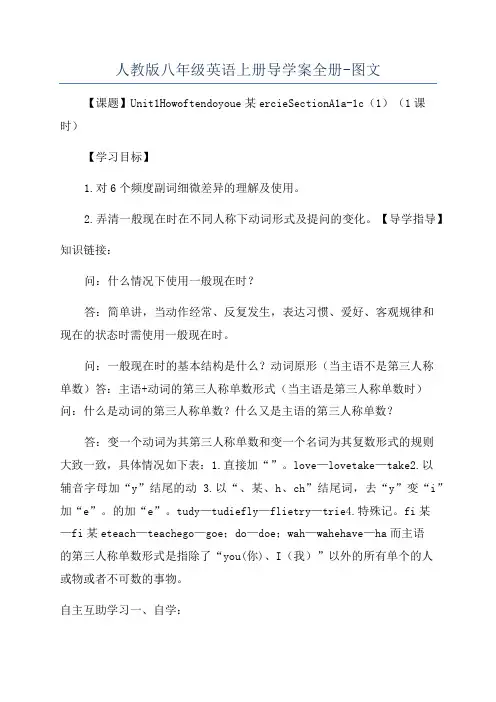
人教版八年级英语上册导学案全册-图文【课题】Unit1Howoftendoyoue某ercieSectionA1a-1c(1)(1课时)【学习目标】1.对6个频度副词细微差异的理解及使用。
2.弄清一般现在时在不同人称下动词形式及提问的变化。
【导学指导】知识链接:问:什么情况下使用一般现在时?答:简单讲,当动作经常、反复发生,表达习惯、爱好、客观规律和现在的状态时需使用一般现在时。
问:一般现在时的基本结构是什么?动词原形(当主语不是第三人称单数)答:主语+动词的第三人称单数形式(当主语是第三人称单数时)问:什么是动词的第三人称单数?什么又是主语的第三人称单数?答:变一个动词为其第三人称单数和变一个名词为其复数形式的规则大致一致,具体情况如下表:1.直接加“”。
love—lovetake—take2.以辅音字母加“y”结尾的动 3.以“、某、h、ch”结尾词,去“y”变“i”加“e”。
的加“e”。
tudy—tudiefly—flietry—trie4.特殊记。
fi某—fi某eteach—teachego—goe;do—doe;wah—wahehave—ha而主语的第三人称单数形式是指除了“you(你)、I(我)”以外的所有单个的人或物或者不可数的事物。
自主互助学习一、自学:1.仔细观察课本第一页图片,根据所给例子填写下列空格。
例:Picturea(图a):hop________________________________.WhatithegirlinPictureadoi ngSheihopping.Pictured:_________________________________________ _____Pictureb:_______abook________________________________.Whati thegirlinPicturebdoingPicturee:____________________________________________________________________________Picturec:____________________ ____________________.________________________________2.根据汉语提示,完成下列其他weekendactivity(周末活动)短语去购物_______________;去钓鱼_______________;去徒步旅行_______________;去看电影______________;去踩滑板_______________;去滑冰________________;去游泳__________________;打篮球__________________;弹钢琴______________;看望外祖父母__________________;为考试学习______________;帮父母做家务__________。
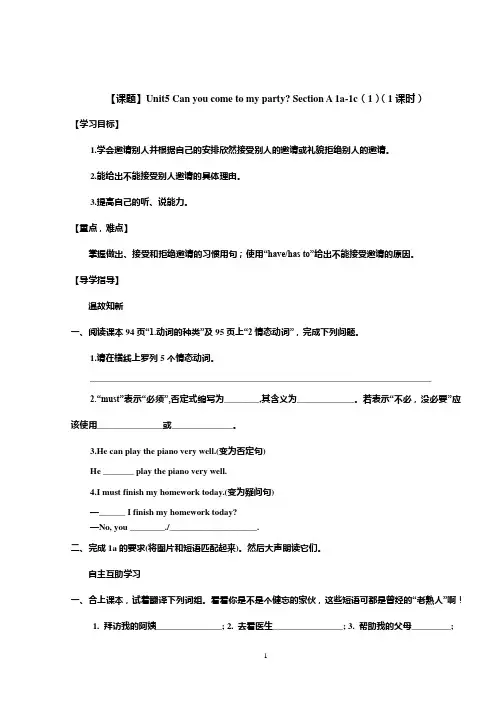
【课题】Unit5 Can you come to my party? Section A 1a-1c(1)(1课时)【学习目标】1.学会邀请别人并根据自己的安排欣然接受别人的邀请或礼貌拒绝别人的邀请。
2.能给出不能接受别人邀请的具体理由。
3.提高自己的听、说能力。
【重点,难点】掌握做出、接受和拒绝邀请的习惯用句;使用“have/has to”给出不能接受邀请的原因。
【导学指导】温故知新一、阅读课本94页“1.动词的种类”及95页上“2情态动词”,完成下列问题。
1.请在横线上罗列5个情态动词。
______________________________________________________________________________2.“must”表示“必须”,否定式缩写为________,其含义为_____________。
若表示“不必,没必要”应该使用_______________或______________。
3.He can play the piano very well.(变为否定句)He _______ play the piano very well.4.I must finish my homework today.(变为疑问句)—______ I finish my homework today?—No, you ________./____________________.二、完成1a的要求(将图片和短语匹配起来)。
然后大声朗读它们。
自主互助学习一、合上课本,试着翻译下列词组。
看看你是不是个健忘的家伙,这些短语可都是曾经的“老熟人”啊!1. 拜访我的阿姨_______________;2. 去看医生________________;3. 帮助我的父母_________;4. 上钢琴课___________________;5. 为考试学习_______________;6.在星期六下午______________。
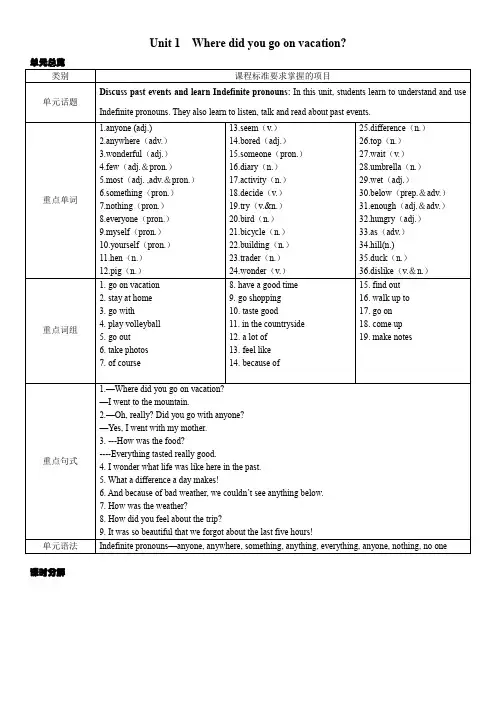
Unit 1 Where did you go on vacation? 单元总览课时分解第一课时 Section A (1a ~ 2d )§自主学习方案学生自学新单词(教材P 的单词),看谁记得又快根据首字母及汉语提示完成句子。
1. He told her not to tell anyone.2. There had never been such a beautiful woman anywhere in the world.3. This world is a wonderful place.4.Only a few people here know his name.5. On Sunday, I like staying at home most of the time to watch TV .6. Quite a few (相当多)students were late this morning.§课堂导学方案Step 1 情景导入 参考案例Teacher: What did you do last Sunday? Students: …Teacher: Today we are going to learn how to talk about past events.环节说明:从询问全班学生的度假情况入手,让学生初步理解对过去事情的谈论,以及其基本结构。
激发学生学习本单元的兴趣,自然地导入新课。
Step 2 完成教材1a-1c 的任务 【操作案例】1. 要求学生翻开课本P1,理解1a 中单词或短语的意思,并按要求完成课本上相应的任务。
(1分钟) Teacher: What at can you see ?Each picture shows something a person did in the past .Now, please match each phrase with one of the pictures .2. 检查答案,先要求几名同学给出他们的不同意见,并全班一起讨论。

人教版英语八年级上册答案导学案集团标准化办公室:[VV986T-J682P28-JP266L8-68PNN]【走进考场】( D )1.Peter is good _____ playing football, so he wants to join the football club.A. toB. withC. forD. at( A )2.--What’s your favorite subject--_____. And I always get a good grade in the test.A. PhysicsB. HomeworkC. MovieD. Concert( A )3.There are some differences between Tom and Jim _____ they are twin brothers.A. thoughB. ifC. untilD. so( B )4.This is not Tina’s ruler. _____ is longer.A. She’sB. HersC. SheD. Her( A )5.--How many children do you have, Mrs. Green--A son and a daughter. And they are ___ students now.A. bothB. allC. everyD. each( B )6.I don’t think Henry is _____than Tony.A. much popularB. more popularC. popularD. most popular( C )7.His funny story made all of them _____.A. laughedB. to laughC. laughD. laughs( D )8.My brother is _____ taller than me.A. veryB. tooC. soD. much( B )9.We have many differences, but we also have some things _____.A. in factB. in commonC. as forD. as well( C )10.--I think Holly should get the job. _____--I think Ruth is smarter.A. What’s the matterB. What does she doC. What’s your opinionD. What’s it like( C )11.Simon and Bruce blue eyes.A. hasB. have bothC. both haveD. all have( A )12.He looks thin, but he isthan before.A. thinnerB. more thinC. more strongD. stronger( C )13.Our city is getting .A. beautiful and beautifulB. more and more beautifulC. more beautiful and more beautifulD. much and much beautiful( A )14.My brother always eats junk food, so he is veryA. unhealthyB. healthyC. healthierD. serious( C )15.Diana is notgood at sportsEmma.A. much ... thanB. very ... asC. so ...asD. as ...so( A )16.Can we finish the work withtime andpeople?A. less, fewerB. lesser, fewC. fewer, lessD. little, fewer( D )17.Dennis is noisy. He talksthan his classmates.A. a littleB. a lotC. muchD. more( B )18.Which story is , this one or that one?A. much interestingB. more interestingC. very interestingD. too interesting ( A )19.This box isthan that one.A. a little heavierB. heavyC. little heavierD. so heavy( D )20.Hehis father, and he is good atbasketball.A. like, playingB. looks like, playC. likes, playing theD. is like, playingUnit 4 What’s the best movie theaterSection A【学习目标】1.学习Section A单词2.分析Section A中重点句子结构并掌握所涉及的知识点【要点突破】fortable seats译:舒适的座位comfortable的词性为形容词,意为“使人舒服的;舒适的”。
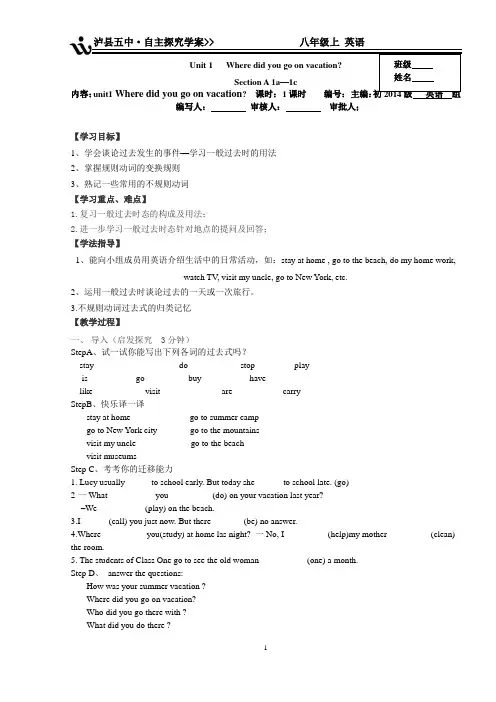
Unit 1 Where did you go on vacation?Section A 1a —1c内容:unit1 Where did you go on vacation ? 课时: 1课时 编号: 主编:初2014级 英语 组编写人: 审核人: 审批人;【学习目标】1、学会谈论过去发生的事件—学习一般过去时的用法2、掌握规则动词的变换规则3、熟记一些常用的不规则动词 【学习重点、难点】1.复习一般过去时态的构成及用法;2.进一步学习一般过去时态针对地点的提问及回答; 【学法指导】1、能向小组成员用英语介绍生活中的日常活动,如:stay at home , go to the beach, do my home work,watch TV , visit my uncle, go to New York, etc.2、运用一般过去时谈论过去的一天或一次旅行。
3.不规则动词过去式的归类记忆【教学过程】一、 导入(启发探究 3分钟)StepA 、试一试你能写出下列各词的过去式吗?stay_________ do_________ stop_________play_________ is_________ go_______ buy_______ have _______like_________ visit_________ are_________ carry_________ StepB 、快乐译一译stay at home_________ go to summer camp_________ go to New York city______ go to the mountains_________ visit my uncle_________ go to the beach_________ visit museums _______ Step C 、考考你的迁移能力1. Lucy usually______to school early. But today she ______to school late. (go) 2一What___________you__________(do) on your vacation last year? --–We___________(play) on the beach.3.I______ (call) you just now. But there_______ (be) no answer.4.Where __________you(study) at home las night? 一No, I__________(help)my mother__________(clean) the room.5. The students of Class One go to see the old woman __________ (one) a month. Step D 、 answer the questions:How was your summer vacation ? Where did you go on vacation? Who did you go there with ? What did you do there ?班级 姓名二、自学(自主探究 6分钟)Step 1c师生、生生操练Where did you go on vacation? I went to New York City.Did you go out with anyone? No, No one was here. Everyone was on vacation. Did you buy anything special? Yes, I bought something for my father. How was the food? Everything tasted really good.Did everyone have a good time? Oh,yes. Everything was excellent. 三、交流(合作探究 10分钟)Step 1a Reciting1.Read the phrases and know their meanings.stay at home_________ go to summer camp_________go to New York city______ go to the mountains_________visit my uncle_________ go to the beach_________visit museums _______2.finish the task:match the activities with the pictures.3.check the answers.4. students read and remember the phrases.Step 1b Listening1.students read the names.2. students guess their activities.3. finish the task:4. check the answers.5. students read and know the mmeaning of this passage.四、总结(引深探究 15分钟)I、语法:一般过去时态的运用1.带有确定的过去时间状语时,要用过去时如:two days ago…、last yearin the old days just nowwhen I was 8 years old yesterdayyesterday?2 表示过去连续发生的动作时,要用过去时这种情况下,往往没有表示过去的时间状语,而通过上下文来表示。
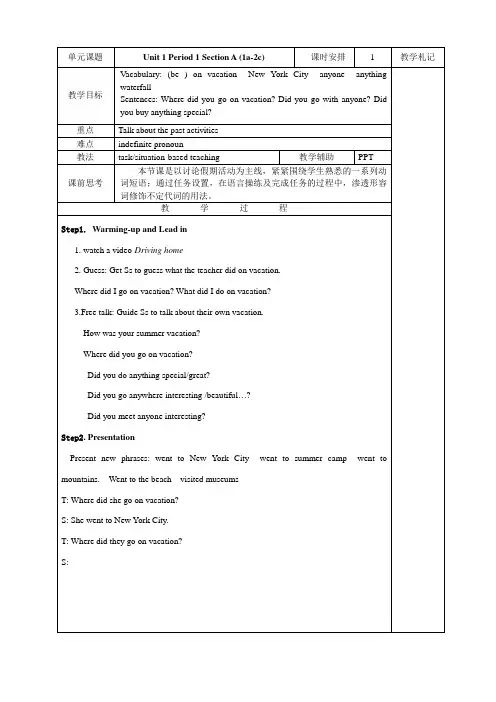
语法归纳Unit 4教学札记形容词的比较级和最高级(二)1. 形容词的比较级和最高级的用法(1)形容词比较级用于两者(人或物)之间的比较,表示一方比另一方“更……”或“较……”,后面通常用比较连词than连接另一方所比较的人或物。
than引导的是比较状语从句,但为了避免重复,从句中有些与主句相同的部分常常省略,而把相比较的部分省略出来。
另外,在上下文明确时,形容词比较级也可以单独使用。
例如:This room is smaller than that one (is). 这个房间比那个房间小。
He is younger than I(am). 他年纪比我小。
His English is better than his brother 's (is). 他的英语比他哥哥的好。
1.形容词最高级用于三者或三者以上的人或事物之间的比较,表示其中一方在三者以上的人或事物中“最……”。
最高级前通常用定冠词the, 并用of或in短语来说明比较的范围。
Of后面一般接表示同类的名词,in接表示范围的名词。
例如:He is the tallest of all. 他是所有人中最高的。
Li Hua is the best student in his class. 李华是他班上最好的学生。
2.比较级与最高级的区别与联系(1)比较级是用来把彼此独立的适合人进行比较;最高级是把一个群体中的一员与整体进行比较,这个群体必须包括这个成员,请看下面例句:(A)Mary is taller than her two sisters. 玛丽比她的两个姐姐高。
(B)Mary is the tallest of the girls. 玛丽是这些女孩中最高的。
【注意】句(A)中玛丽是在另外两个姐妹之外,是玛丽一个人同另外两姐妹(作为一方)来比较,所以用比较级。
句(B)中玛丽是这些女孩之一,所以用最高级。
(2)比较级可以用来表示最高级的含义。
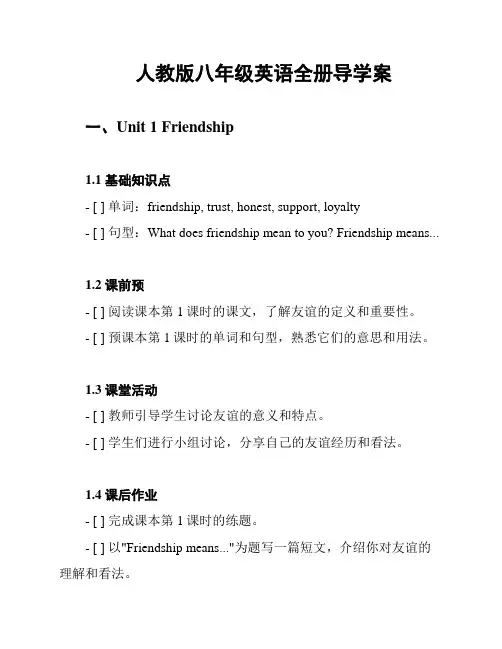
人教版八年级英语全册导学案一、Unit 1 Friendship1.1 基础知识点- [ ] 单词:friendship, trust, honest, support, loyalty- [ ] 句型:What does friendship mean to you? Friendship means...1.2 课前预- [ ] 阅读课本第1课时的课文,了解友谊的定义和重要性。
- [ ] 预课本第1课时的单词和句型,熟悉它们的意思和用法。
1.3 课堂活动- [ ] 教师引导学生讨论友谊的意义和特点。
- [ ] 学生们进行小组讨论,分享自己的友谊经历和看法。
1.4 课后作业- [ ] 完成课本第1课时的练题。
- [ ] 以"Friendship means..."为题写一篇短文,介绍你对友谊的理解和看法。
二、Unit 2 Family2.1 基础知识点- [ ] 单词:family, member, value, support, care- [ ] 句型:What does family mean to you? Family means...2.2 课前预- [ ] 阅读课本第2课时的课文,了解家庭的定义和重要性。
- [ ] 预课本第2课时的单词和句型,熟悉它们的意思和用法。
2.3 课堂活动- [ ] 教师讲解家庭的定义和重要性,并引导学生进行课堂讨论。
- [ ] 学生们根据所学知识,从自身角度描述家庭的意义和作用。
2.4 课后作业- [ ] 完成课本第2课时的练题。
- [ ] 以"Family means..."为题写一篇短文,介绍你对家庭的理解和看法。
...(继续编写其他单元的导学案)八、总结与反思- [ ] 回顾本学期所学内容,总结并思考其中的重要概念和关键词。
- [ ] 以"我的英语研究感悟"为题,写一篇短文,总结自己对英语研究的认识和体会。
八年级上册英语导学案Unit1 Where did you go on vacation?Period 1 Section A (1a-2c)知识目标1. 口、笔头掌握以下句型-Where did you go on vacation? -I went to the mountains.-Where did Tina go on vacation? -She went to the mountains.-Did you go with anyone? -Yes, I went with my mother.2.熟练掌握以下词汇:vacation, mountain, special, anyone技能目标:复习并掌握动词一般过去式的构成规律; 能用一般过去式叙述假期所做的事。
通过对过去事情的谈论,增进同学的相互了解。
1. 你能用英语写出下列短语吗?呆在家里_________ 去纽约市_________ 拜访我的叔叔_________去夏令营_________ 去爬山_________ 去海滩_________参观博物馆_________ 买特别的东西_________ 遇见有趣的的人_________做有趣的事情_________II. 回忆并默写出规则动词过去式的变化规则:1.______________2. ______________3. ______________4. ______________III. 做调查,问问你的同伴上个暑假都去了哪儿?Before listening1. 小组内交流课前准备1中的短语,并大声朗读三遍2. 两人一组,用课前准备III的内容对话。
3. Do 1a.观察与复习:1a 中用的动词是______时态。
规则动词过去式的变化规则是:(课前准备II)______________________While listening1. 1b listen twice and number the people in the picture.2. 1c Pairwork. Make conversations about the people in the picture.3. 2a Listen twice and complete the chart.4. 2b Listen twice again and check Yes or No for each question.5. 模仿秀:听录音中的重点句段,反复跟读,模仿语音语调。
形容词的比较级和最高级(二)1。
形容词的比较级和最高级的用法(1)形容词比较级用于两者(人或物)之间的比较,表示一方比另一方“更……”或“较……”,后面通常用比较连词than 连接另一方所比较的人或物。
than 引导的是比较状语从句,但为了避免重复,从句中有些与主句相同的部分常常省略,而把相比较的部分省略出来。
另外,在上下文明确时,形容词比较级也可以单独使用。
例如:This room is smaller than that one (is). 这个房间比那个房间小。
He is younger than I(am)。
他年纪比我小.His English is better than his brother 's (is ). 他的英语比他哥哥的好。
1. 形容词最高级用于三者或三者以上的人或事物之间的比较,表示其中一方在三者以上的人或事物中“最……”。
最高级前通常用定冠词the , 并用of 或in 短语来说明比较的范围。
Of 后面一般接表示同类的名词,in 接表示范围的名词。
例如: He is the tallest of all. 他是所有人中最高的.Li Hua is the best student in his class. 李华是他班上最好的学生。
2.比较级与最高级的区别与联系(1)比较级是用来把彼此独立的适合人进行比较;最高级是把一个群体中的一员与整体进行比较,这个群体必须包括这个成员,请看下面例句: (A )Mary is taller than her two sisters. 玛丽比她的两个姐姐高。
(B )Mary is the tallest of the girls. 玛丽是这些女孩中最高的。
【注意】句(A )中玛丽是在另外两个姐妹之外,是玛丽一个人同另外两姐妹(作为一方)来比较,所以用比较级.句(B )中玛丽是这些女孩之一,所以用最高级。
(2)比较级可以用来表示最高级的含义。
人教版八年级英语上册导学案全册Unit1 Where did you go on vacation?(Section A)课时:第1-2课时学习目标:1.学会谈论过去的事2.学会谈论节假日的活动学习重点:1.一般过去时的陈述句,一般疑问句及回答和特殊疑问句学习难点:熟练使用本单元重点句型,进行日常交流。
一、课前尝试:(一)写出下列动词的单三,现在分词和过去式(go goes going went)1.be _____ ______ _____2.study _____ ______ _____3.watch _____ ______ _____4.eat _____ ______ _____5.have _____ ______ _____6.sit _____ ______ _____7.see _____ ______ _____ e _____ ______ _____(二)词汇知识先知道:1.dear(同义词)________2.guide(名词)_____ _3. friendly(反义词)_______4.friendly (名词)_____5.activity(复数)__6.dislike (反义词) ____7.like(反义词)_____ 8.decide(名词)___________ 9.make(过去式)____10.building(动词) ________ 11.visit(名词)____________ 12.go(过去式)______13.wait (名词) ___________ 14.difference(形容词)____ 15.cry(现在分词)___ (三) 短语互译:1.呆在家里__________ 2.由于__________3.看望我叔叔_________4.去夏令营___________5.去爬山________6.去海滩__________二、课堂探究(一)Do you know how to talk about past events? 你知道如何谈论过去发生的事吗?(二)How to ask the weather?1. What’s the weather like today ? 同义句____________________翻译___________________2. What was the weather like yesterday? 同义句________________翻译___________________(三)To talk about“What did you do on vacation?”(四)用所给词的适当形式填空1. Jim and Bob ___________ (come) to China last month.2. LiLei _________________(not go) to bed until 12 o’clock last night.So he ______ (get ) up late.3. Anna __________ (read) English yesterday morning.4. There _________ (be) no one here a moment ago.5. I ___________ (call) Lucy this morning.6. I listened but ___________ (hear) nothing.7. Mary ___________ (begin) to learn Chinese last year.8. Last week we _________ (pick) many apples on the farm.三、课后检测:(一)用所给词的适当形式填空1. Jack ______ (be) often late for school last term.2. It was ______ (rain) yesterday but it is sunny today.3. We have great fun _______ (learn) English.4. The dog made the baby ________ (cry).5. Can you help me ________ (study) English?6. What ______ you _______last night? (do)7. We ______(go) to the museum yesterday. It was _____(crowd).8. Lucy _______(write) two letters to her friends two days ago.(二)认真阅读下列句子, 选出最佳答案.( )1.How __________ your vacation? - It was pretty good.A. wasB. wereC. didD. is( )2.Where __________ they go yesterday? They went to the Summer Palace.A. areB. doC. didD. were( )3. --- Where did you go on vacation? I __________ my grandma.A. visitB. visitedC. visitsD. am visiting( )4.Betty stayed at home and __________ for the test last weekend.A. studyB. studyedC. studied D studies四、作业设计:单项选择()1.The boys are having great fun ______ in the waves.A.play B.to play C.played D.playing()2.Thank you very much for _________us so well.A.teachB. teachingC. teachesD. taught()3. How’s the weather in Shanghai ? _________.A. It raining.B. It is rain C .It is rainy. D. It rainy.()4.It has five _______ years of history.A. thousand B.thousands C.thousand of D.thousands of ()5.—When _______ a sports meeting? ---Last Monday.A. had you B.do you have C.did you have D.will you have ()6. How is it going? ______.A. It's sunny. B.It's hot. C.It's right. D.It's pretty good()7.Listen! Who ________?A. sings so wellB. is sing so wellC. is singing so wellD. singing so well( ) 8. “You are a very beautiful girl.”“________”A. No, I’m not.B. Sorry, I don’t.C. Thank you.D. Yes, I do. ( ) 9 He didn’t have_____ money for a taxi, ______ he walked back to the hotel.A. any, andB. much, becauseC. any, soD. some, so( ) 10. On Sunday morning I helped my mother ____ the cooking.A. doB. to doingC. doesD. doing( ) 11.---__________ ? ---He did some reading at home.A. What does your father do yesterday eveningB .What does your brother do in the schoolC. What did your brother do over the weekendD. Where did your brother go last SundayUnit 1 Where did you go on vacation?(Section B)课时:第3-4课时学习目标:1.学会如何用一般过去时谈论发生在过去的事情学习重点:一般过去时学习难点:How to use keep,enough and such…that correctly学习过程:一、课前尝试:(一)英汉互译:(一)熟读Section B 3a,然后完成下列英汉互译1.发现某人正在做某事_______________2.丢失,失踪, 迷路____________________3.帮助某人做某事__________________4.使得某人……做某事__________________5.决定去做某事___________________6.走回某地_______________________7. 打排球______________________ 8.干……事很愉快__________________9.记日记_______ 10.the Palace Museum_________(一)enough的用法(二)1.so +形容词或者副词+that+从句意思是:如此...以致于结果状语从句2.such +a /an + 形容词+名词+that+从句,当名次是不可数或者复数时,用such +形容词+不可数名词或者复数+that+从句Those are such beautiful flowers that we all like them.3.too+形容词或者副词+to do sth 意思是:太...而不能The boy is too young to carry the box.4.形容词/副词+enough +to do sth 意思是:...足够去做某事The boy is old enough to go to school.实战演练: 同义句转换1.This is so heavy a box that I can't carry it2.This is a heavy box I can't carry it3.This box is heavy me carry4.This box isn't carry三、课后检测:(一)根据所给句意及首字母提示完成下列单词拼写使句意通顺完整。
全册导学案Unit 1 Where did you go on vacation?Section A 1a—1c内容:unit1 Where did you go on vacation? 课时:1课时英语组编写人:审核人:审批人;【学习目标】1、学会谈论过去发生的事件—学习一般过去时的用法2、掌握规则动词的变换规则3、熟记一些常用的不规则动词【学习重点、难点】1.复习一般过去时态的构成及用法;2.进一步学习一般过去时态针对地点的提问及回答;【学法指导】1、能向小组成员用英语介绍生活中的日常活动,如:stay at home , go to the beach, do my home work,watch TV, visit my uncle, go to New York, etc.2、运用一般过去时谈论过去的一天或一次旅行。
3.不规则动词过去式的归类记忆【教学过程】一、导入(启发探究 3分钟)StepA、试一试你能写出下列各词的过去式吗?stay_________ do_________ stop_________play_________is_________ go_______ buy_______ have _______like_________ visit_________ are_________ carry_________StepB、快乐译一译stay at home_________ go to summer camp_________go to New York city______ go to the mountains_________visit my uncle_________ go to the beach_________visit museums _______Step C、考考你的迁移能力1. Lucy usually______to school early. But today she ______to school late. (go)2一What___________you__________(do) on your vacation last year?--–We___________(play) on the beach.3.I______ (call) you just now. But there_______ (be) no answer.4.Where __________you(study) at home las night? 一No, I__________(help)my mother__________(clean) the room.5. The students of Class One go to see the old woman __________ (one) a month.Step D、answer the questions:How was your summer vacation ?Where did you go on vacation?Who did you go there with ?What did you do there ?二、自学(自主探究 6分钟)Step 1c师生、生生操练Where did you go on vacation? I went to New York City.Did you go out with anyone? No, No one was here. Everyone was on vacation. Did you buy anything special? Yes, I bought something for my father. How was the food? Everything tasted really good.Did everyone have a good time? Oh,yes. Everything was excellent. 三、交流(合作探究 10分钟)Step 1a Reciting1.Read the phrases and know their meanings.stay at home_________ go to summer camp_________go to New York city______ go to the mountains_________visit my uncle_________ go to the beach_________visit museums _______2.finish the task:match the activities with the pictures.3.check the answers.4. students read and remember the phrases.Step 1b Listening1.students read the names.2. students guess their activities.3. finish the task:4. check the answers.5. students read and know the mmeaning of this passage.四、总结(引深探究 15分钟)I、语法:一般过去时态的运用1.带有确定的过去时间状语时,要用过去时如:two days ago…、last yearin the old days just nowwhen I was 8 years old yesterdayDid you have a party yesterday?2 表示过去连续发生的动作时,要用过去时这种情况下,往往没有表示过去的时间状语,而通过上下文来表示。
The boy opened his eyes for a moment,looked at the captain,and then died.那男孩把眼睛张开了一会儿,看看船长,然后就去世了。
3 表示过去一段时间内经常或反复的动作常与always,never 等连用。
彼得太太过去老是带着一把伞。
及时练习:用be动词的适当形式填空①I _______ at school just now.② He ________ at the camp last week.③ We ________ students two years ago.④They ________ on the farm a moment ago.⑤Yang Ling ________ eleven years old last year.⑥ There _______ an apple on the plate yesterday.⑦There _______ some milk in the fridge on Sunday.⑧The mobile phone _____ on the sofa yesterday evening.II、词语运用—Where did he go on vacation?他去哪儿度假的?—He stayed at home.他呆在家里。
stay at home“呆在家里”是一固定短语,类似的还有:stay in bed“卧床”,be at home“在家”,be at school“在上学”,be at work“在工作”等等。
五、练评(包含“考点链接”应用探究 6分钟)I. 用动词的适当形式填空:1.Tom and Mary ___________ (come) to China last month.2.Mike _____(not go) to bed until 12 o’clock last night. So I_____(get ) up late.3.Mary __________ (read) English yesterday morning.4.There _________ (be) no one here a moment ago.5.I ___________ (call) Mike this morning.6.I listened but ___________ (hear) nothing.7.Tom ___________ (begin) to learn Chinese last year.st week we _________ (pick) many apples on the farm.9.My mother ________________ (not do) housework yesterday.10.She watches TV every evening. But she ______ (not watch) TV last night.用括号内动词的正确形式填空Last year Mr. Smith _____ (go ) to China and Japan. He _____ (have) awonderful time. He _____ (do) a lot of different things and _____ (talk) toa great number of different people. He _____ (eat) Chinese and Japanesefood and _____ (visit) a lot of interesting places. When he _____ (go) backto England, he _____ (be) very tired.【总结反思】Unit 1 Where did you go on vacation?Section A 2a—2c【学习目标】1、一般过去时的特殊疑问句及答语。
Where did you/he/she/they go on vacation?She went to the beach.【学习重点、难点】重点疑点:一般过去时的用法,利用情景思维在理解句意的基础上理解词汇的用法,记忆重点词汇,句型和语法内容。
【学法指导】1、在谈论过去发生的事件时,动词应用,2、一般问句记两点,一句首加,二动词变。
【教学过程】一、导入(启发探究 3分钟)I 写出下列动词的过去式。
(1)draw ___________ (2)swim _____________(3)study __________ (4)bring _____________(5)begin __________ (6)learn ______________(7)get ____________ (8)sleep _____________(9)lie(躺)_______ (10)enjoy ____________II、按要求变换句型:1. I saw a lot of children ____________ on the playground.(正在打篮球)2. Yesterday we went to the park. We had a great time there.(改成近义句)Yesterday we went to the park. We _________ _________ there.3. I paid 20 yuan for the new book. (改成近义句)I _______ __________ _________ ______ the new book.4. My family and I visited some places of interest.(变成疑问句)_____________________________________________5. We did our homework.(变成否定句)_______________________________________________III、快乐译一译go with someone_________ go out with someone _______go to New York city______ buy something special_________meet someone interesting_________ study for________do something interesting _________go to central park________二、自学(自主探究 6分钟)A、猜一猜Where did I go on vacation? 请运用你学过的所有活动的名称。